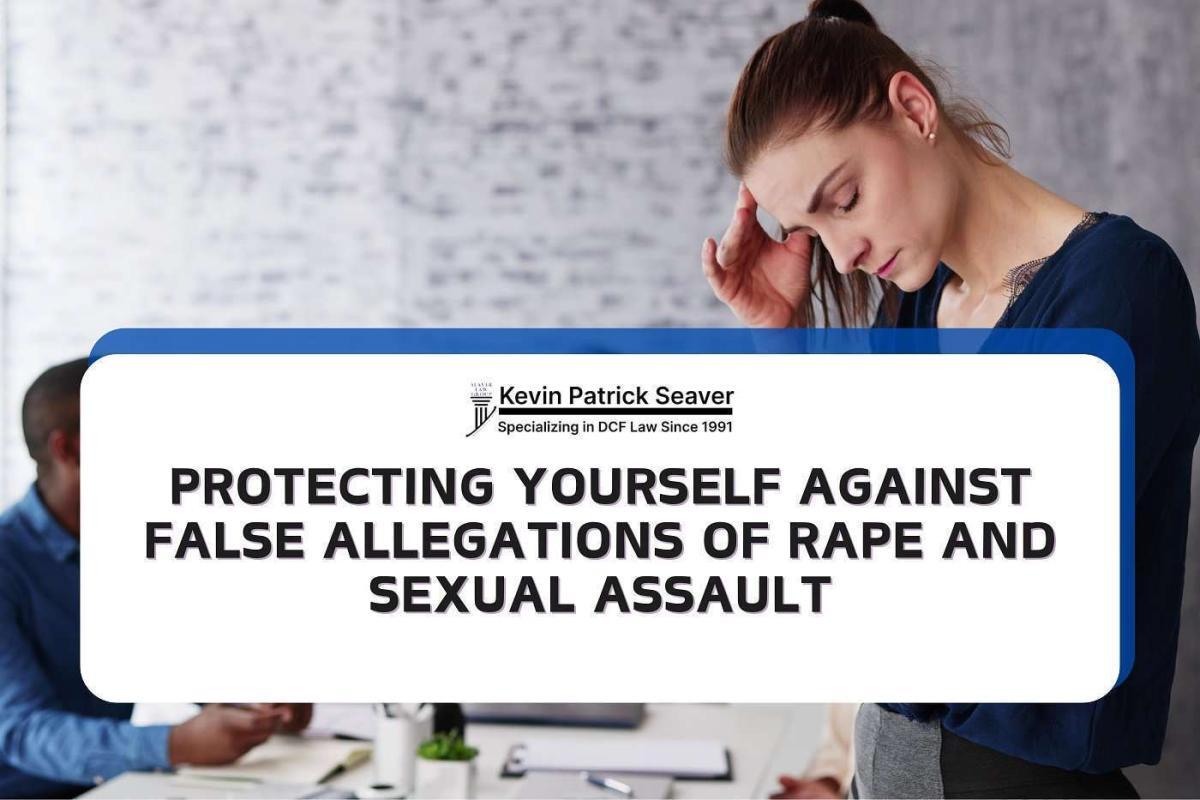How You can Protect Yourself from False DCF Allegations of Abuse
Alt txt: Protecting Yourself Against False Allegations of Rape and Sexual Assault
Imagine this scenario: In Massachusetts, there’s a couple named Adam and Jane (not their real names) who suddenly find themselves in a tough spot. Their neighbor, Paul, is very upset with them for vacuuming late at night. The noise is preventing Paul from falling asleep. Instead of talking to them, Paul falsely reports to the Department of Children and Families (DCF) that he is hearing “concerning sounds” from his neighbor’s apartment and thinks Adam may be sexually abusing his daughter.
This accusation may sound bizarre, but false allegations from people like angry neighbors like Paul are actually surprisingly common. Paul was using the “system” as a sword rather than a shield. Unfortunately, DCF doesn’t know these are false allegations until they do their investigation. But Paul knows DCF will go and cause trouble for the targeted family.
When someone tells a lie about you, it can feel really confusing and scary. Especially when that lie is about something as serious as how you treat your own family. Adam and Jane’s situation gets even more difficult because DCF is a powerful organization that tends to act first and ask questions later.
Instead of helping to clear up the misunderstanding, DCF involvement tends to make couples like Adam and Jane feel like they are under a microscope, with every action being doubted and scrutinized.
In this article, we’re going to talk about steps you can take if you ever find yourself in a similar situation. We’ll also dive into why organizations like DCF sometimes make situations feel worse and what can be done to make sure they help families rather than cause them more stress.
Understanding False Allegations of Sexual Assault
False allegations of sexual assault are not only distressing but can also have lasting repercussions on the accused’s personal and professional life. These allegations may stem from misunderstandings, personal conflicts, or malicious intent. While Paul was angry about the noise produced by Adam and Jane’s cleaning, it is crucial for individuals to recognize that these allegations can come from anyone at any time.
How Common Are False Allegations?
Although false claims represent a small fraction of all sexual assault allegations, their impact is disproportionately severe. Research indicates that roughly 2% to 10% of all sexual assault reports are unfounded, varying by region and definition used in the studies.
In Massachusetts, the rate of false reports is in line with national averages, but every case brings its unique challenges and requires meticulous scrutiny.
Unfortunately, DCF does not always do the level of investigation necessary to get to the truth. Each accusation must be handled with utmost care, as the personal and legal consequences for the accused can be devastating, leading to potential job loss, social ostracization, and psychological stress.
This backdrop sets the stage for understanding the gravity of each case and the necessity for skilled legal intervention to safeguard the accused’s rights and reputation.
Navigating the Legal Landscape
The legal consequences of being accused of rape and sexual assault can be severe, so it is important to seek the guidance of a reputable law firm to help navigate the complex legal terrain.
This is because DCF effectively serves as an extension of the police. When DCF questions you during their investigation, they can and will share your answers with the District Attorney (DA). These allegations not only tarnish someone’s reputation but also puts them at risk of police involvement and jail time.
Strategies for Fighting False Allegations Before a Criminal Trial
When facing false accusations of sexual assault, the defense strategy must be robust and multifaceted. This is why we draw on years of legal practice as a criminal defense attorney to establish your innocence prior to a criminal hearing. Here are some effective approaches:
Evidence Preservation
Immediately securing any potential evidence such as texts, emails, and surveillance footage can prove crucial. These items can contradict the accuser’s narrative and demonstrate the accused’s whereabouts and actions at the relevant times, providing supporting evidence that can clear an innocent person.
Witness Testimony
Gathering statements from witnesses who can attest to their recollection of events is crucial in dismantling false claims. Witnesses can offer an alternative account of events or affirm the accused’s good character, challenging the credibility of the accuser’s story.
Expert Testimony
Employing experts to challenge the validity of the accuser’s claims or to provide psychological insights can be a game-changer before court and in court. Expert testimony may involve evaluating the accuser’s mental capacity, inconsistencies in their story, and their propensity to commit this type of crime.
Each of these strategies hinges on a deep understanding of both legal precedents and the psychological dynamics of false accusers, emphasizing the necessity of experienced legal guidance from a defense attorney specializing in these types of cases.
Massachusetts DCF Laws and Procedures on False Sexual
Allegations
It is important to remember DCF plays a critical role in handling cases that involve allegations of sexual abuse. This means that these cases tend to be multifaceted, involving both DCF allegations and criminal charges. Understanding the laws and procedures that guide DCF’s actions in these cases is crucial for anyone involved, particularly when the allegations are suspected to be unfounded. Here’s a detailed look at how DCF handles these sensitive matters:
Initial Assessment
- Screening: Each report is screened to determine the immediacy and severity of the allegation. This process decides whether the case requires an emergency response or a more standard investigation.
- Investigation: If the report is screened in, DCF assigns an investigator to conduct a thorough inquiry. This involves interviewing the child, the accused, and any potential witnesses.
It also often involves communicating with the DA and scheduling a SANE interview of the child. The investigator gathers evidence from all necessary sources, including medical examinations and psychological evaluations, and can provide this information directly to the DA.
Investigation Outcomes
After completing the investigation, DCF reaches a conclusion which can be one of the following:
- Supported: The false accusation is found credible based on the evidence. This doesn’t necessarily mean a legal determination of guilt but is enough for DCF to take protective actions including either an assessment or removal of the children
- Unsupported: There is not enough evidence for a reasonable person to believe the allegations are true. The case is closed.
- Substantiated: The evidence is enough to warrant intervention, but there is more uncertainty regarding the severity of the allegations. DCF involvement may continue but it is unlikely that any criminal case will go forward.
Appeals Process
Individuals who disagree with DCF’s findings have the right to appeal:
- Fair Hearing: The accused can request a fair hearing if they believe DCF’s findings are unjust. This hearing is an administrative proceeding where both sides can present evidence and arguments before a fair hearing officer.
- Court Appeals: Following a fair hearing, further appeals can be taken to court if the party still disputes the outcome.
Legal Procedures and Rights

If DCF does involve the DA and charges are brought, individuals accused of sexual assault have legal rights that must be protected. Understanding these rights and the legal process is crucial for mounting a defense.
- Right to legal representation: Accused individuals have the right to be represented by an attorney throughout the legal process.
- Right to remain silent: Accused individuals have the right to refuse to answer questions from DCF and law enforcement.
- Right to a fair trial: Accused individuals have the right to a fair and impartial trial by a jury of their peers.
- Right to confront witnesses: Accused individuals have the right to confront and cross-examine witnesses against them.
- Right to present evidence: Accused individuals have the right to present evidence in their defense.
- Right to appeal: Accused individuals have the right to appeal a conviction if they believe there were errors in the legal process.
Key Takeaway
Successfully addressing false allegations of sexual assault requires a comprehensive strategy addressing both the DCF and criminal sides simultaneously. It’s crucial to understand you have different legal rights and obligations when addressing DCF and the court.
Consult with a knowledgeable attorney specializing in sexual assault cases. Gather evidence to support your innocence, seek emotional support, and maintain open communication with your attorney. By taking proactive measures, you can navigate this challenging situation with confidence.
Take Control of Your Defense: Contact Us Today for the Best Defense Attorney!
To obtain specialized legal advice and representation against unfounded sexual assault accusations in Massachusetts, please reach out to Attorney Kevin Seaver at (617) 263-2633 or visit his website to schedule a consultation.
With Attorney Seaver’s expertise and dedication, you can trust that your case will be handled with the utmost professionalism and care. Don’t face these serious allegations alone—take the first step towards protecting your rights and reputation today.
DISCLAIMER
You find yourself in this situation, it’s advisable to seek legal representation from a qualified attorney, like those at the Law Office of Kevin Seaver, who can advocate for your rights and guide you through the complex process of a DCF investigation.
Remember that the ultimate goal of DCF is to ensure the safety and well-being of children while supporting families in crisis.
Please note that this article does not create an Attorney-Client relationship between our law firm and the reader and is provided for informational purposes only. Information in this article does not apply to all readers.
Readers should not rely on this information as legal advice and should seek specific counsel from the attorney based on personal circumstances. Thank you.
Kevin Patrick Seaver is a Massachusetts DCF Defense Lawyer who represents parents against false child abuse allegations.

Massachusetts DCF Defense Lawyer Kevin Seaver has been successfully fighting false child abuse allegations since 1991.


